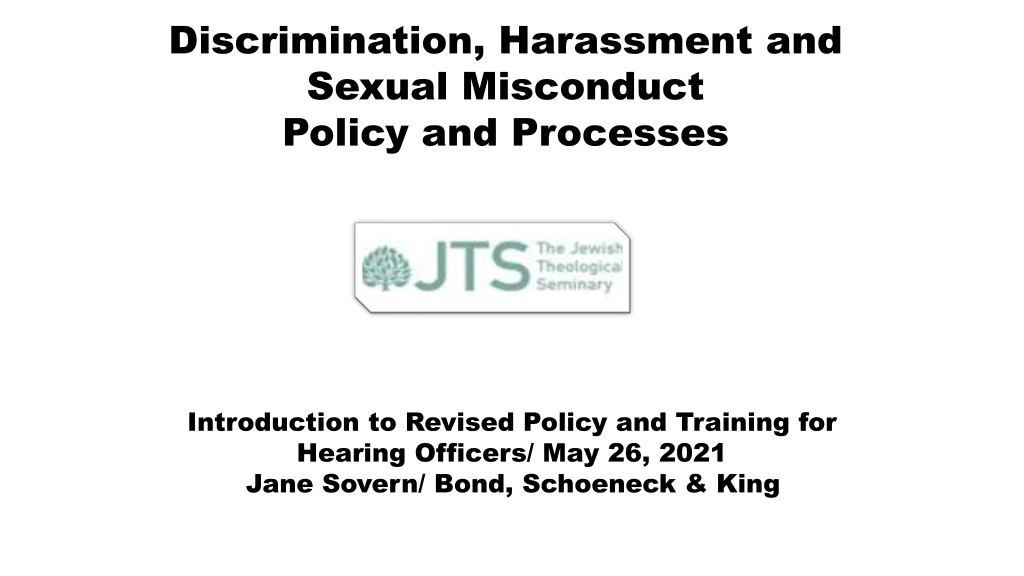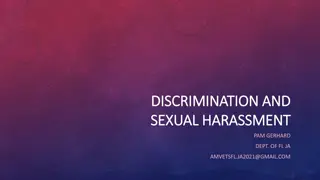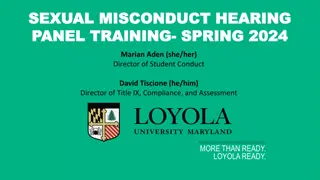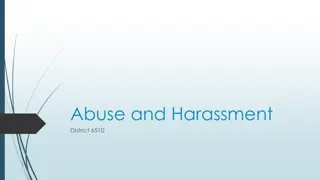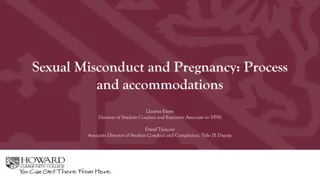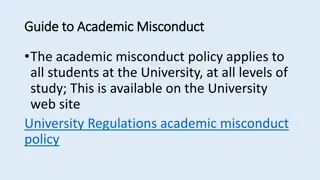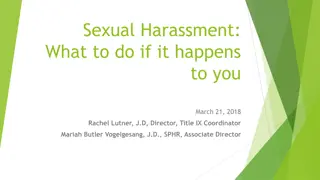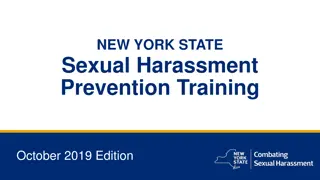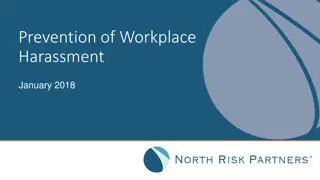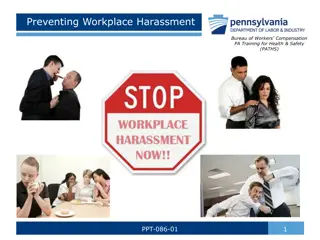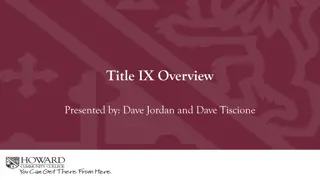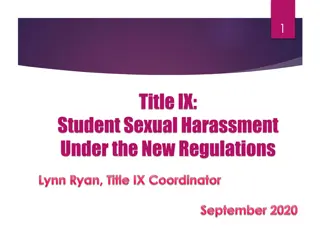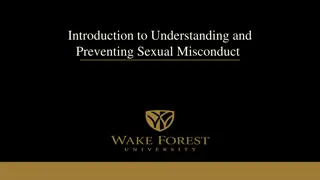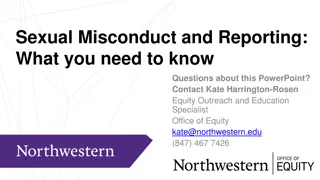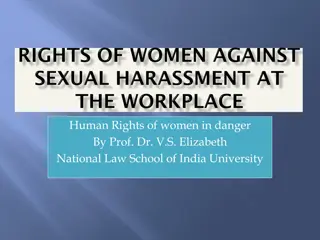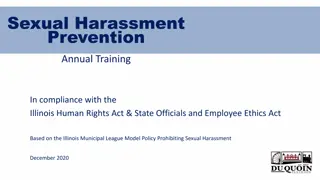Revised Discrimination, Harassment, and Sexual Misconduct Policy Updates
This revised policy presentation outlines the changes and processes related to discrimination, harassment, and sexual misconduct at Jane Sovern/Bond, Schoeneck & King. It covers the background, transitions to new policies, scope of the policy, and governing laws such as Title IX and VAWA. The policy governs conduct involving members of the community and outlines reporting and investigation processes.
Download Presentation

Please find below an Image/Link to download the presentation.
The content on the website is provided AS IS for your information and personal use only. It may not be sold, licensed, or shared on other websites without obtaining consent from the author. Download presentation by click this link. If you encounter any issues during the download, it is possible that the publisher has removed the file from their server.
E N D
Presentation Transcript
Discrimination, Harassment and Sexual Misconduct Policy and Processes Introduction to Revised Policy and Training for Hearing Officers/ May 26, 2021 Jane Sovern/ Bond, Schoeneck & King
HOW DID WE GET HERE? HOW DID WE GET HERE? 2011 Dear Colleague Letter RESCINDED 2014 OCR Q&A RESCINDED 2017 OCR Rescission and Guidance 2018 Proposed Title IX Regulations May 6, 2020 Final Title IX Regulations (effective August 14, 2020) 2
TRANSITION TO NEW JTS POLICIES TRANSITION TO NEW JTS POLICIES August 5, 2020 OCR Guidance JTS Implementation: Policy is effective as of August 14, 2020, and governs all reports, complaints, and formal complaints of prohibited conduct Reports or complaints made prior to the effective date will be reviewed under the prior JTS Student Gender-Based Misconduct Policy and the JTS Harassment Prevention Policy for Employees 3
SCOPE OF JTS NON SCOPE OF JTS NON- -DISCRIMINATION AND DISCRIMINATION AND ANTI ANTI- -HARASSMENT POLICY HARASSMENT POLICY Policy: Covers all forms of discrimination, harassment and sexual misconduct in both employment and access to educational opportunities Governs all such conduct involving members of JTS community, including JTS students, student organizations, employees (faculty, administrators, and staff), prospective students and employees, contractors, subcontractors, vendors, or third parties such as visitors, guests, and volunteers, and others who are affiliated with JTS and within JTS s control Processes: Process A or Process B, as determined by Title IX Coordinator (TIXC) Process A applies only to qualifying allegations of sexual harassment under Title IX, including sexual assault, dating violence, domestic violence, and stalking Process B applies to all other forms of prohibited conduct, including sexual misconduct that the Title IX Coordinator determines does not fall within Process A Both Process A and Process B contain an informal process 4
SCOPE: GOVERNING LAWS SCOPE: GOVERNING LAWS Title IX (2020 vintage) VAWA Amendments to Clery Act (2014) New York Education Law Article 129-B ( Enough is Enough ) (2015) 5
Basic VAWA Violence Against Women Act (VAWA) Historically, a law designed to increase criminal prosecution of crimes against women 2014 amendments focus on four concepts: oSexual assault oDating violence oDomestic violence oStalking Required increase in education/training, additional amounts of notification and policy elements Created advisor of choice entitlement 6
Basic Enough is Enough NYS law that went into effect in October 2015 (Article 129-B) Also focuses on 4 categories (sexual assault, domestic violence, dating violence and stalking) Right to an appeal before a panel if the respondent/accused is a student Right to seek review of interim/corrective measures imposed Single statewide definition of affirmative consent Right to written notice in advance of any investigatory or disciplinary meeting Right to have prior sexual history excluded if it involves any person other than the other party to the complaint Right to have mental health diagnosis or treatment excluded Advisor of choice Student Bill of Rights and other verbatim policy requirements 7
2020 TITLE IX PARAMETERS 2020 TITLE IX PARAMETERS Scope of covered offenses Institutional Education Program or Activity Locations, events, or circumstances where the institution exercises substantial control over both the Respondent and the context in which the conduct at issue is alleged to have occurred Any building owned or controlled by a student organization that is officially recognized by the institution Within the United States Complainant must be participating or seeking to participate in educational program or activity 8
SCOPE OF JTS POLICY AND PROCESSES SCOPE OF JTS POLICY AND PROCESSES Title IX s Must Dismiss Provision: TIXC must dismiss allegations for purposes of Title IX if it is apparent that the allegations are not within the scope of Title IX: Would not meet USDOE s regulatory definition even if proved Conduct did not occur in the University s education program or activity Conduct did not occur against a person in the United States Institutional discretion to process pursuant to non-Title IX provisions of institutional policies Naming conduct or allegations as Title IX Allegations (Process A) or Other Sexual Misconduct Violations (Process B) is not a function of the seriousness of the allegations. The difference reflects the now more limited scope and coverage of Title IX as opposed to JTS s broader obligations under NY Education Law Article 129-B, and JTS s discretion to prohibit and discipline a larger scope of inappropriate behavior 9
SCOPE OF JTS POLICY AND PROCESSES SCOPE OF JTS POLICY AND PROCESSES (cont d) (cont d) Policy applies to: All of JTS s operations, including computer and internet networks, digital platforms, computer hardware and software owned, operated, or used in JTS operations including online postings and other electronic communications in violation of the Policy On-campus programs and activities, including in JTS provided housing, property owned or controlled by JTS Off-campus programs and activities sponsored by JTS, e.g., study abroad Conduct will be addressed by applicable Process Title IX Offenses Process A Other Prohibited Conduct Process B ( 10
SCOPE OF JTS PROCESSES SCOPE OF JTS PROCESSES Process A Title IX Violations: Sexual Harassment Sexual Assault Dating Violence Domestic Violence Stalking * Also covers discrimination based on sex, gender, sexual orientation, or gender identity or expression, and other grounds Process B * All Other Sexual Misconduct Violations: Sexual Harassment Sexual Assault Dating Violence Domestic Violence Stalking Sexual Exploitation Prohibited Consensual Relationships Hate Crimes Retaliation 11
CONFIDENTIALITY AND PRIVACY ISSUES: CONFIDENTIALITY AND PRIVACY ISSUES: JTS POLICY DEFINITIONS JTS POLICY DEFINITIONS Confidentiality may be offered by an individual who is not required by laws to report known incidents of sexual assault or other crimes to institution officials, in a manner consistent with state and federal law, including but not limited to [the Clery Act and Title IX]. Licensed mental health counselors, medical providers and pastoral counselors are examples of institution employees who may offer confidentiality. Privacy may be offered by an individual when such individual is unable to offer confidentiality under the law but shall still not disclose information learned from a reporting individual or bystander to a crime or incident more than necessary to comply with applicable laws, including informing appropriate JTS officials. 12
CONFIDENTIALITY AND PRIVACY ISSUES: CONFIDENTIALITY AND PRIVACY ISSUES: REPORTING SUSPECTED INCIDENTS REPORTING SUSPECTED INCIDENTS Members of JTS community who witness or become aware of a potential instance of sexual harassment should report to a supervisor, manager, or TIXC Mandated Reporters who witness, receive a complaint or information about, or suspect that sexual harassment is occurring or has occurred are required to share their knowledge with the TIXC. This includes: Faculty Residence Life staff, including RAs Student Affairs staff Deans and all Associate and Assistant Deans Chancellor and all Vice Chancellors Provost and Assistant Provost Chief Human Resources Officer Chief of Security All other managers, supervisors and security personnel Even mandated reporters who cannot guarantee confidentiality will still maintain the privacy of an individual reporting sexual misconduct to the greatest extent possible. 13
CONFIDENTIALITY AND PRIVACY ISSUES: CONFIDENTIALITY AND PRIVACY ISSUES: ROLES OF RABBIS ROLES OF RABBIS Rabbis in JTS administration and faculty are mandated reporters Very limited exception: only when Rabbi acting as pastoral counselor Recognized as someone who provides confidential counseling Functions within the scope of that recognition during the confidential communication, e.g., when individual seeks spiritual/moral guidance or counseling from the rabbi Interaction must be clearly outside of the scope of their duties as JTS faculty or administrators, and fact that counseling or guidance was sought made clear from the outset of conversation or interaction. The presumption, however, is that faculty and administration members, even if they are rabbis, are not acting in their capacity as pastoral counselors when communicating with JTS students or employees and are required to report any possible violation of this Policy to the TIXC. 14
CONFIDENTIALITY AND PRIVACY ISSUES: CONFIDENTIALITY AND PRIVACY ISSUES: HEARING OFFICERS HEARING OFFICERS Confidentiality v. Privacy: JTS employees have varying levels of responsibility to maintain confidentiality Every employee, including those who cannot guarantee confidentiality, must maintain an individual s privacy to the greatest extent possible Importance of Privacy in Hearing Officer Role Legal and policy requirements (FERPA, JTS Policy) Sensitive nature of information Difficulty of a close-knit, relatively small community Fairness to all parties Damaging short-term and long-term effects of revealing information to individuals, to process, to JTS Role-switch exercise 15
QUESTIONS? 16
THE NEW POLICY: HOW DOES IT WORK? Informal resolution widely available Investigation process largely unchanged If no informal resolution, hearings required for alleged Title IX violations (Process A) Cross-examination requirement Other allegations may be resolved with or without hearings (Process B) No cross-examination Discontinuance Resolution without a hearing 17
COMPLAINT PROCESS Anyone can report a concern or a violation A written Formal Complaint must be filed to access the formal adjudication process or the informal resolution process (but not supportive measures) Filed by the person who allegedly experienced the misconduct or by the TIXC Evaluation of reporting party s wishes and public safety considerations 18
STUDENT ALCOHOL AND DRUG USE AMNESTY POLICY This policy is a NY State law (EIE) requirement: The health and safety of every student at JTS is of utmost importance. JTS recognizes that students who have been drinking and/or using drugs (whether such use is voluntary or involuntary), at the time that violence, including but not limited to domestic violence, dating violence, stalking, or sexual assault occurs may be hesitant to report such incidents due to fear of potential consequences for their own conduct. JTS strongly encourages students to report domestic violence, dating violence, stalking, or sexual assault to JTS officials. A bystander acting in good faith, or a reporting individual acting in good faith that discloses any incident of domestic violence, dating violence, stalking, or sexual assault to JTS officials or law enforcement will not be subject to JTS s code of conduct action for violations of alcohol and/or drug use policies occurring at or near the time of the commission of the domestic violence, dating violence, stalking, or sexual assault. 19
SUPPORTIVE MEASURES Available without a formal complaint Available to both parties Designed to restore or preserve equal access to JTS s education program or activity Non-disciplinary and non-punitive May not unreasonably burden the other party Available without fee or charge Must be kept confidential if possible Implementation is coordinated by the TIXC 20
SUPPORTIVE MEASURES (contd) Examples (may not be available/appropriate in every case): Changes or adjustment in academics (e.g., deadline extensions, other course- related adjustments or allowing withdrawal without penalty) Changes to housing, transportation or campus working situations Mutual No Contact orders and, in certain cases, one-way no contact orders Campus escorts or other security or monitoring measures Counseling services Parties can request reconsideration of a denial of a supportive measure, or a grant of a supportive measure, if it affects them. TIXC will consider evidence and argument and make a determination. 21
EMERGENCY REMOVAL OF RESPONDENT Must be based on an immediate threat to the physical health or safety of any student or other individual arising from the allegations Based on individualized safety and risk analysis, removal may be total or partial Respondent is provided notice and an opportunity to challenge the decision immediately following the removal Submitted to and decided by TIXC This is a student process Employees may be placed on administrative leave (consistent with applicable policies or CBAs) 22
POTENTIAL DISMISSAL OF COMPLAINT OR ALLEGATIONS (PROCESS A) Mandatory dismissal requirement (as previously described) Discretionary dismissal (in whole or in part) Complainant withdraws complaint or specific allegations Respondent is no longer enrolled or employed Circumstances prevent the gathering of evidence sufficient to reach a determination May occur at any juncture Immediately appealable by complainant 23
INFORMAL RESOLUTION Must be preceded by formal complaint Available any time prior to final resolution of allegations No longer a categorical prohibition in cases of sexual violence May not be used to resolve allegations that an employee sexually harassed a student Complainant, respondent and TIXC must consent to use the process At any time prior to agreeing to a resolution, any party has the right to withdraw from the informal resolution process and resume (or commence) the grievance process Confidential process All persons participating in the informal resolution process, including facilitator, must sign a confidentiality agreement that provides that no information revealed by a party in the informal resolution process will be used against that party in a hearing Does not apply to information learned outside the informal resolution process (but not learned through a violation of the confidentiality agreement). 24
INFORMAL RESOLUTION (contd) Result subject to approval by the TIXC Result not appealable and not subject to further review or appeal under other JTS policies or procedures If process does not result in an agreed-upon resolution, investigation of the allegations in the complaint will commence (or resume) and the formal investigation and resolution process will proceed from there 25
NOTICE OF INVESTIGATION Notice of Investigation: Identities of involved parties Date, time, location of the alleged incident(s) (to the extent known) Factual allegations concerning the alleged violation(s), and policy provisions allegedly violated Description of the investigation and adjudication process Potential sanctions Presumption of non-responsibility of respondent Right to advisor of choice Right to inspect and review evidence obtained as part of the investigation and directly related to the allegations raised in the Formal Complaint, including evidence JTS does not intend to rely on in reaching a determination regarding responsibility Prohibition on knowingly making false statements or knowingly submitting false information Statement about the JTS s policy on retaliation 26
THE INVESTIGATION Assignment of investigator(s), which may include outside investigator(s), and screening for conflict of interest (3 days to object) Investigation process has 90-day presumptive time frame, permitted delays Advisor of choice Quiet advice and consultation Party must be provided with advance notice of date, time, location, participants and purpose of any interview In person, telephone, or videoconference Parties may not record Opportunity for interviewee to review transcript or summary of interview and make corrections 27
THE INVESTIGATION SCOPE Parties entitled to present any evidence directly related to the allegations (including request for witness interviews): Fact witnesses Expert witnesses Character witnesses Other inculpatory and exculpatory evidence May not access privileged records without consent Impact of cross-examination requirement 28
CONCLUDING THE INVESTIGATION Right of parties to review case file (10-day minimum) before investigator completes written report All evidence gathered that is directly related to allegations Even if won t be used or included in report Electronic or hard copy, or availability via file-sharing application Confidentiality obligations apply Opportunity to respond in writing to the evidence during 10-day period 29
INVESTIGATION REPORT Summary of investigation Compilation of and addressing of all relevant evidence No conclusions as to responsibility or credibility, policy analysis, or recommendations as to responsibility or sanctions Exclusions: Complainant s sexual history or predisposition (with exceptions) Privileged records unless privilege is waived Respondent s sexual history not necessarily Mental health diagnosis or treatment unless party gives written permission 30
PARTIES ACCESS TO THE INVESTIGATION REPORT Parties have the right to review and respond in writing to report at least 10 days before hearing (if applicable), and to see each other s response Electronic or hard copy, or availability via file-sharing application Confidentiality obligations apply Following 10 days, TIXC will assign matter to Hearing Officers for hearing 31
APPOINTMENT OF ADVISORS Parties may have an advisor either of their choice, or of JTS s choice who is appointed at no cost to them, to be present during any grievance process meeting, interview, or hearing, to advise and assist a party. This includes assisting and advising regarding any subsequent hearing, resolution without a hearing and/or appeal[s]) An advisor may be but is not required to be, an attorney, and must sign a form acknowledging compliance with JTS rules. Advisors may not disrupt the process and must abide by restrictions on their participation in JTS rules. 32
DETERMINATION OF NEXT STEPS Cases including allegations of Title IX Violations must go to hearing Additional options in cases not including allegations of Title IX Violations: TIXC may determine that continuing with the complaint process is not warranted oSubject to appeal Case may be referred to another applicable process if warranted If alleged violations, and therefore the range of possible sanctions, are minor, may be resolved without a hearing oSubject to appeal 33
QUESTIONS? 34
THE HEARING PROCESS (PROCESS A) New regulations require a live hearing model for allegations meeting the Title IX definitions Institutions may conduct live hearing virtually, with technology enabling participants simultaneously to see and hear each other Hearing Officers will receive training as appropriate on technology being used at hearing, JTS staff member may be assigned to assist with or operate technology 35
NOTICE OF HEARING (PROCESS A) TIXC will provide Notice of Hearing to parties, includes: Date, time, and location of hearing (hearing must occur at least 10 days after report) Name of Hearing Officers Specific charges of violations of JTS policies How to challenge participation by any Hearing Officer for bias or conflict of interest a party must notify the Title IX Coordinator of the specific reason for their objection Title IX Coordinator determines whether the challenge has merit, and may change the challenged Hearing Officer 36
HEARING OFFICER CONFLICT/BIAS (PROCESS A) Identify any potential conflict or bias you have Just knowing who a complainant or respondent is or having met or interacted with them is not a conflict A conflict is a relationship with a party or knowledge about them that precludes you from being impartial A conflict or bias could also be a connection to the subject matter or an interest in the outcome that precludes you from being impartial o Note TIX regulations and JTS policy: Bias for or against complainants or respondents generally, or for or against the specific parties Consider appearances When in doubt, self-identify any situation that could create even the appearance of bias or a conflict 37
HEARING PARTICIPANTS (PROCESS A) Hearing Officers Complainant and their advisor Respondent and their advisor Investigator(s) Witnesses (solely during their own testimony) 38
ADVISORS PROCESS A Advisor of Choice If a party does not have an advisor present at the hearing, JTS will provide an advisor of its choice, without cost to the party Roles: Quiet advice and support Questioning of opposing party and witnesses May not disrupt hearing 39
HEARING LOGISTICS - PROCESS A May be conducted with all parties physically present in the same location At the TIXC s discretion, parties, witnesses, and other participants may appear at the hearing virtually Hearing Officers and parties can simultaneously see and hear any party or witness providing information or answering questions If either party requests, the hearing must be conducted with the parties located in separate rooms using virtual participation Hearings are recorded (audio, audiovisual, or written transcript) 40
ORDER OF PROCEEDINGS PROCESS A Hearing Officers have discretion suggested order: Opportunity for Opening Statement by the Complainant Opportunity for Opening Statement by the Respondent Summary of the results of the investigation by the investigator(s), including items that are contested and those that are not Questions for the investigator(s) by the Hearing Officers and, if desired, on behalf of Complainant and the Respondent (as described below) 41
ORDER OF PROCEEDINGS PROCESS A (contd) Questions for the Complainant by the Hearing Officers and, if desired, on behalf of the Respondent Questions for the Respondent by the Hearing Officers and, if desired, on behalf of the Complainant Questions for each witness by the Hearing Officers and, if desired, on behalf of Complainant and the Respondent Opportunity for Closing Statement by the Complainant Opportunity for Closing Statement by the Respondent 42
HEARING OFFICERS DISCRETION (PROCESS A) Hearing Officers have broad discretion Questions of procedure Evidentiary determinations Calling breaks or temporary adjournments Determining order of the proceedings Recalling parties or witnesses for additional questions Establishing additional ground rules 43
RIGHT TO CROSS-EXAMINATION (PROCESS A) Hearing Officers must permit each party to cross-examine the other party and any witnesses and ask all relevant questions, including those challenging credibility Cross-examination may only be conducted by advisor, never by the parties Upon request, cross-examination will occur with the parties located in separate rooms with technology enabling the Hearing Officers and parties to simultaneously see and hear the party answering questions If a party desires cross-examination and does not have an advisor, JTS will provide, without fee or charge to that party, an advisor of JTS s choice to conduct questioning on behalf of that party 44
RIGHT TO CROSS-EXAMINATION (PROCESS A) A party cannot fire an assigned advisor during a hearing, but if the party raises concerns that the assigned advisor is refusing to conduct cross- examination on the party s behalf there is an obligation to provide the party an advisor to perform that function. This may range from taking a break, to having the TIXC confer with the assigned advisor, to assigning a new advisor 45
QUESTIONING PROTOCOLS (PROCESS A) Broad authority: All relevant questions and evidence must be allowed unless prohibited by Policy History and information indicating a pattern of behavior Character evidence Expert witness opinions Questions challenging credibility Exceptions (questions about these topics are not relevant): Prior sexual history of complainant (unless offered to prove that someone other than respondent committed the alleged conduct, or if concern specific incidents with respondent and are offered to prove consent) Mental health diagnosis and/or treatment (unless party waives in writing) Privileged communications unless privilege waived Evidence not previously made available during investigation, unless allowed by the Hearing Officers 46
QUESTIONING PROTOCOLS (PROCESS A) cont d Hearing Officers must rule on whether questions are relevant or violate rape shield protections or a legally recognized privilege and provide an explanation for excluding a question Before party or witness answers Request for reconsideration permitted; after soliciting the other party s advisor s opinion, the Hearing Officers will render a final determination 47
LIVE HEARING ASSESSING RELEVANCY (PROCESS A) USDOE: Use common sense meaning Must seek information making a material fact more or less likely to be true Things may be interesting or surprising but not be relevant Does the question seek information that will aid the decision-maker in making the underlying determination? Determination as to relevance should not be based on: who asked the question possible (or clearly stated) motives who the question is directed to the sex, gender, sexual orientation, gender identity, gender expression or other characteristics of the party for whom a question is asked or to whom it is asked the status as complainant or respondent of the party for whom a question is asked or to whom it is asked 48
LIVE HEARING ASSESSING RELEVANCY (PROCESS A) cont d Preamble of Final Rule: A recipient may not adopt a rule excluding relevant evidence because such relevant evidence may be unduly prejudicial, concern prior bad acts, or constitute character evidence. A recipient may adopt rules of order and decorum to forbid badgering a witness and may fairly deem repetition of the same question to be irrelevant. 49
IMPLICATIONS OF REFUSAL TO SUBMIT TO CROSS-EXAMINATION (PROCESS A) If a party or witness does not submit to cross examination, that individual s statement(s) may not be considered for purposes of determining responsibility Broad application oPreamble: Police reports, SANE reports, medical reports, and other documents and records may not be relied on to the extent that they contain the statement of a party or witness who has not submitted to cross-examination. Applies to questions by parties advisors only, not to questions from the Hearing Officers 50
